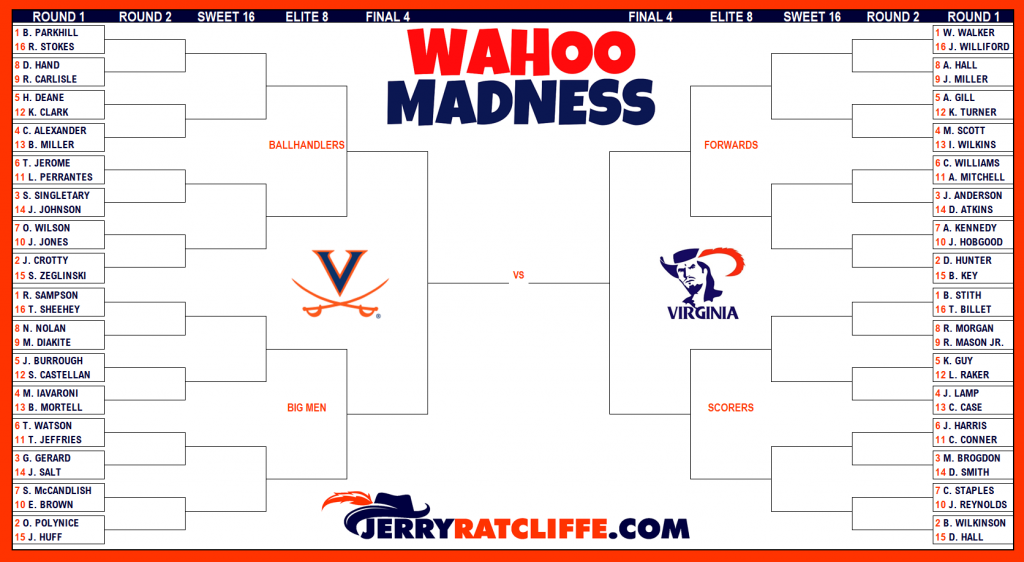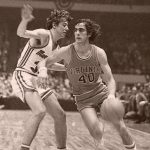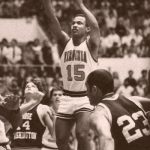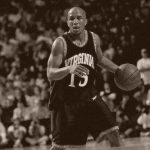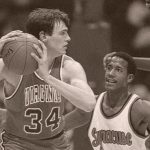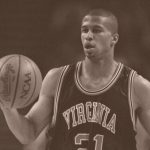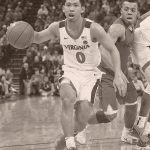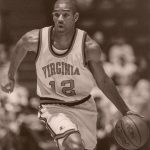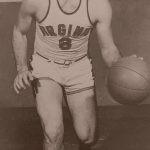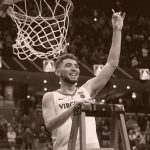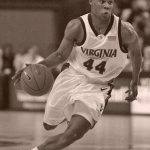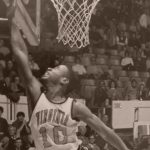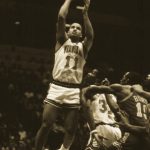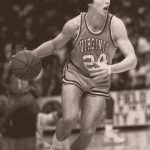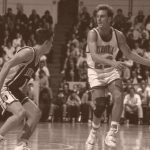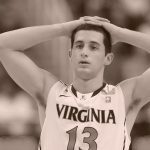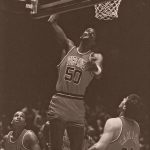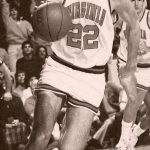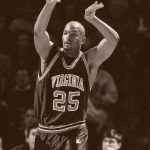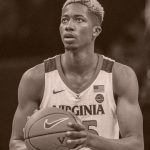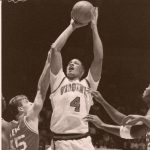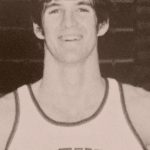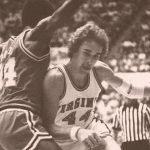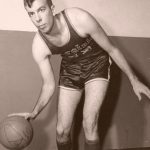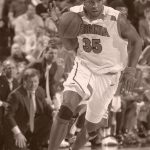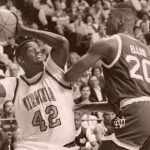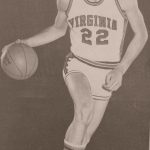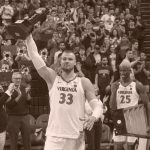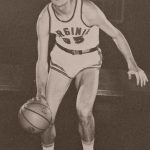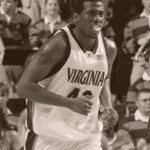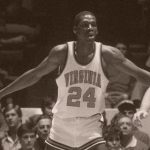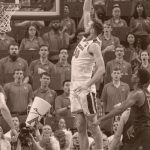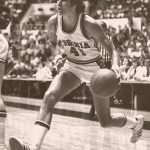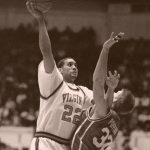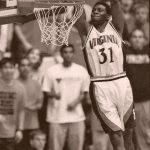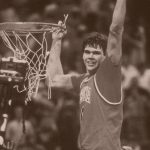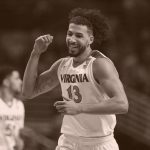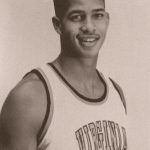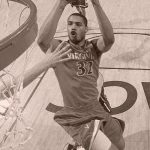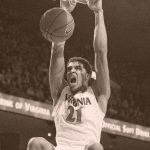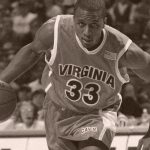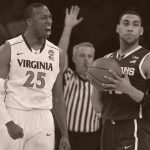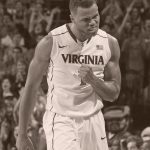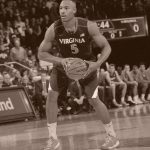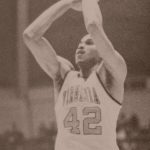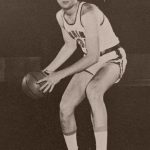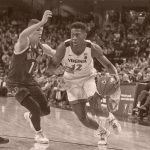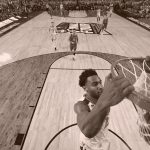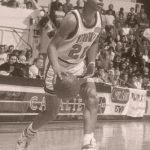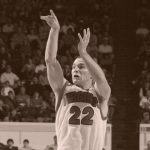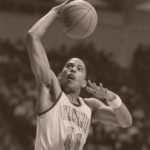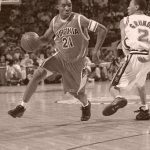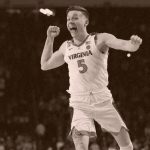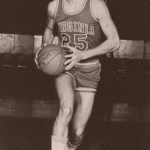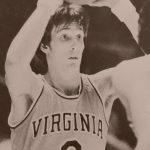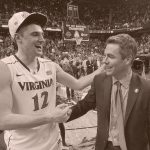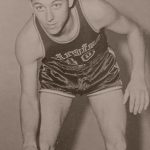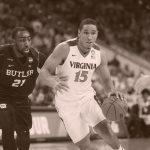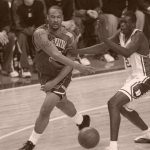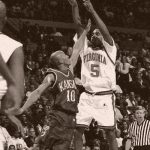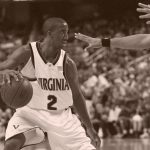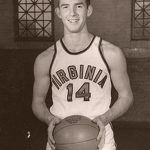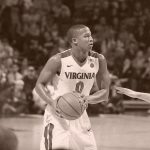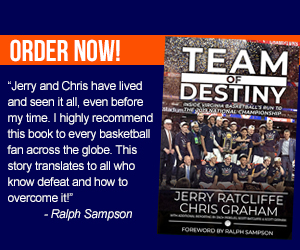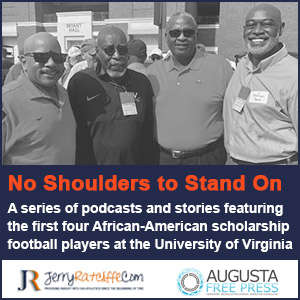Wahoo Madness: Round of 64
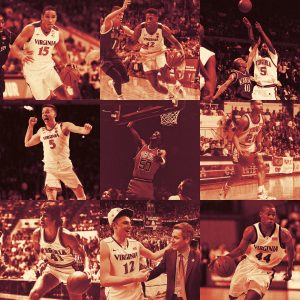 The field of 64 is set for Wahoo Madness, our All-Time Virginia basketball bracket voted on by you, the Cavalier fans.
The field of 64 is set for Wahoo Madness, our All-Time Virginia basketball bracket voted on by you, the Cavalier fans.
We appreciate the voting turnout for the play-in round, and now the results are in and we’re ready to rock with the “Big Dance.” You voted six former ‘Hoos — Devon Hall, Braxton Key, Tom Sheehey, Ricky Stokes and Jason Williford — along with rising senior 7-footer Jay Huff into the main bracket, so now the real fun begins.
Here’s a quick look at the final results from the play-in round:
- Ricky Stokes def. Jontel Evans, 82% to 18%
- Devon Hall def. Tony Laquintano, 79% to 21%
- Todd Billet def. Keith Friel, 51% to 49%
- Braxton Key def. Jamal Robinson, 72% to 28%
- Jason Williford def. Jim Connelly, 83% to 17%
- Jay Huff def. Herb Busch, 85% to 15%
- Tom Sheehey def. Mike Tobey, 56% to 44%
Below is our bracket of the 64 Cavalier greats that made the cut, broken up into four “regions” — Ballhandlers, Shooters, Forwards and Big Men. We did our best, with the help of a few long-term observers, media and former players to assemble this list and give the fans a little bit of March Madness in a unique way, since there are unfortunately no “shining moments” to experience through the Big Dance this season, other than the fact that your Cavaliers are still reigning national champs for one more year.
We realize this list may not be perfect. Yes, there may be a few guys that some folks think don’t belong, or some folks may think we left a couple of deserving players out, or maybe you think someone is seeded incorrectly. Just try to keep in mind that this is all unofficial and is for fun and to help us all get through March Madness.
That being said, there were a few difficult decisions when it came to who made the cut among our five-person seeding panel, so we also included an honorable-mention list for some of the terrific former players who were left out: Paul Adkins (1958-60); Herb Busch (1957-59); Mac Caldwell (1963-65); Norm Carmichael (1967-69); Jim Connelly (1965-67); Colin Ducharme (1997-2000); Gene Engel (1961-63); Jontel Evans (2010-13); Mustapha Farrakhan (2008-11); Keith Friel (2000-01); Bill Gerry (1969-71); John Gidding (1967-69); Bob Hardy (1956-57); Mike Katos (1966-68); Mel Kennedy (1985-88); Sylven Landesberg (2009-10); Billy Langloh (1974-77); Tony Laquintano (1960-62); Bob McCarty (1954-56); Vic Mohl (1950-52); Joe Noertker (1947-50); Jamal Robinson (1994-97); William Strickling (1914-16); Mike Tobey (2013-16); Mike Wilkes (1968-71).
 As for the bracket itself, the official voting will be conducted round by round (all the results will be posted here on the site), but we encourage you to take a moment to print and fill out your own picks to follow along and see how much Wahoo Nation agrees with your overall selections.
As for the bracket itself, the official voting will be conducted round by round (all the results will be posted here on the site), but we encourage you to take a moment to print and fill out your own picks to follow along and see how much Wahoo Nation agrees with your overall selections.
Our first-round voting will run from today until next Thursday (March 26) at 11:59 p.m. ET, to allow plenty of time to read about the accomplishments of each player in each matchup and decide who you think should advance to the next round.
We’ll reveal the 32 first-round winners next Friday and present the second-round matchups soon thereafter.
We’ve provided brief player capsules to give you a sense of what these players brought to the court if you’re maybe somewhat unfamiliar with the name, while also rehashing memories of some of your favorites.
After reading the player bios, you can make your selections below, check back for updated results, and if you’ve got a few other Wahoo friends, please feel free to share away! (Note: click on any image to enlarge.)
THE BRACKET
BALLHANDLERS REGION VOTING
No. 1 Barry Parkhill (1971-73)
18.2 ppg, 4.1 rpg
vs.
No. 16 Ricky Stokes (1981-84)
4.8 ppg, 1.2 rpg, 1.6 apg
A two-time All-American (1972, 1973), Parkhill ranks 21st on the UVA career scoring list with 1,437 points. He scored a school-record 51 points against Baldwin-Wallace in Dec. of 1971 and scored 30-plus five times over his career. Parkhill led the Cavaliers in scoring in each of his three seasons on the varsity squad, and led the ACC in scoring in 1971-72 (21.6 ppg). Parkhill, whose jersey number (40) is retired, was ACC Player of the Year in 1971-72 and was named the conference’s overall Athlete of the Year. He was also voted to the All-ACC Tournament first team in both 1971 and 1972. Parkhill, drafted by the Portland Trail Blazers in the first round of the 1973 NBA Draft, instead signed with the Virginia Squires of the ABA. He is one of three former ‘Hoos selected to the ACC 50th Anniversary Team in 2002, and is considered one of the best all-purpose guards in conference history.
Stokes, who prevailed over Jontel Evans in the play-in round, followed older brother Bobby to Terry Holland’s program. The Richmond native played in a then-school record 134 straight games. Enormously popular, Stokes was a team captain and won the Naismith Award’s “best player under six feet tall” in the nation in ’84. Stokes averaged 4.8 points, had 140 steals and 159 assists. He shot 53.4 percent for his career and 76.3 percent from the line, and was a member of both the ‘81 and ‘84 Final Four teams under Holland.
No. 8 Donald Hand (1998-2001)
12.4 ppg, 3.3 rpg, 4.4 apg
vs.
No. 9 Rick Carlisle (1983-84)
11.1 ppg, 2.9 rpg, 2.9 apg
A three-time team captain in each of head coach Pete Gillen’s first three years at the helm, Hand ranks 19th on Virginia’s all-time scoring list with 1,486 points. Cavalier fans will never forget when he set the UVA single-game scoring mark for a sophomore, pouring in 41 points against NC State in 1999. Hand ranks fifth on the school’s all-time assists list with 529 and is one of only five Cavaliers with 500 dimes or more. Hand is also tied for fifth in steals with 179.
Carlisle transferred from Maine and was a member of two of UVA’s greatest teams in 1983 and 1984, averaging 11.1 points a game. Carlisle shot 51.4 percent from the field and 77 percent from the free-throw line, and registered 193 assists over his two seasons. He was considered a “coach on the floor” for his exceptional basketball IQ. After being drafted in the third round by the Boston Celtics in the 1984 NBA Draft, Carlisle went on to play five years in the NBA, winning a title with Boston in 1986, and is now head coach of the Dallas Mavericks, where he won another championship ring in 2011.
No. 5 Harold Deane (1994-97)
14.5 ppg, 3.6 rpg, 3.8 apg
vs.
No. 12 Kihei Clark (2018-present)
7.3 ppg, 3.1 rpg, 4.0 apg
Deane is 10th on the UVA career scoring list with 1,763 points and seventh in assists with 468. Deane also ranks fourth in career 3-point makes with 237, and is tied for fifth on the career steals list with 179. The gritty guard averaged more minutes than any other Cavalier since the stat began being kept in 1972-73. Deane was a hard-nosed, instinctive throwback point guard that helped lead the ‘Hoos to the Elite Eight in 1995. He was named to the ACC All-Freshman Team and the All-ACC Tournament first team in 1994.
Clark has blossomed in only two years time under immense pressure. The 5-foot-9 scrapper has already carved his name in Wahoo history for his clutch, last-second assist to Mamadi Diakite at the end of regulation against Purdue to help UVA reach the Final Four for the third time. Legendary broadcaster Jim Nantz calls it one of the greatest plays in NCAA Tournament history. Clark followed up his memorable freshman campaign with third-team All-ACC honors as a sophomore after hitting several game-winning shots. We’re excited to see what this kid can do as an upperclassman.
No. 4 Cory Alexander (1992-95)
15.1 ppg, 3.5 rpg, 4.7 apg
vs.
No. 13 Bill Miller (1955-57)
13.6 ppg, 4.3 rpg
Alexander ranks 28th in the UVA career scoring category with 1,286 points. One of the most highly recruited players in UVA history from Oak Hill Academy by way of nearby Waynesboro, Alexander was both a McDonald’s and Parade All-American and the centerpiece of the UVA recruiting class that was ranked second behind Michigan’s “Fab Five.” Alexander, who’s 10th on the Cavaliers’ career assist list with 401, had his career cut short with injuries or his numbers would be even more impressive. He was a second-team All-ACC selection in 1993, and also made the All-ACC Tournament first team and was a USBWA All-District selection. Drafted by the San Antonio Spurs with the 29th pick in 1995, Alexander went on to play professionally and is now an ACC hoops TV analyst.
Miller is the only player in UVA history not named Ralph Sampson to record a triple-double. In February of 1955, Miller posted 11 points, 10 rebounds and 10 assists against NC State as the point guard for prolific scorer Buzzy Wilkinson. Under head coach Evan “Bus” Male, Miller was selected to the All-ACC Tournament second team in both 1955 and 1956, and was team captain in Male’s final season in 1957. Unfortunately, we can’t compare Miller’s assist numbers because that statistical category did not officially exist until the early 80s.
No. 6 Ty Jerome (2017-19)
9.6 ppg, 3.0 rpg, 3.7 apg
vs.
No. 11 London Perrantes (2014-17)
8.9 ppg, 2.7 rpg, 4.1 apg
Jerome is tied for third on the single-season assist list with 202 over the national championship season. He tied the single-game school record of 14 helpers against Syracuse in his final home game. Jerome is tied for fourth on the single-season steals list with 57, which was the most ever recorded by a Cavalier junior. The Mad Bomber had no fear when it came to shooting deep 3-pointers, especially in crunch time. He sank a few of the most memorable shots in UVA history, but a few of them will always stand out. We all recall the one from nearly halfcourt at the block-S logo at Syracuse in a Wahoo 3-point barrage, the one at the end of the first half in the national title game that gave the ‘Hoos a halftime lead. But the one Jerome shot that will never be forgotten by Cavalier fans was his dagger at Cameron Indoor Stadium in 2018 to clinch the first UVA win at Duke in over 20 years. Jerome was drafted by the Phoenix Suns in the first round (24th pick) of the NBA Draft (traded from the Philadelphia 76ers).
Perrantes ranks 34th in career scoring with 1,225 points and fourth in assists with 569. Perrantes also ranks seventh in career 3-pointers made with 211 and owns the third-best 3-point shooting percentage (.409). The Cali Kid always played cool under pressure as floor general for some of Tony Bennett’s greatest teams. Somewhat of a reluctant shooter, the coaching staff and teammates almost had to prod him to put up shots. When he did shoot, he was very capable. Perrantes has enjoyed a successful professional career, and is currently a member of the Capital City Go-Go, the G League affiliate of the Washington Wizards. Perrantes holds the UVA record for most career starts with 132.
No. 3 Sean Singletary (2005-08)
16.9 ppg, 4.0 rpg, 4.8 apg
vs.
No. 14 John Johnson (1985-88)
9.2 ppg, 1.9 rpg, 3.9 apg
Singletary ranks fifth on UVA’s career scoring list with 2,079 points. Only four other Cavaliers have reached the 2,000-point plateau. The Philadelphia native is third on the career assists list with 587, and holds the record for most assists by a Virginia senior with 202. Singletary is second on the career steals list with 200, nabbing 60 as a senior. Only he and Othell Wilson recorded 60 or more steals in a single season as a ‘Hoo. Singletary is one of only five Cavaliers to have recorded a school-record 7 steals in one game. Singletary, who also ranks fifth in school history in 3-pointers made with 222, is one of just eight players in UVA history to have his number retired (44), and one of only four Cavaliers to earn first-team All-ACC honors three times (2006, 2007, 2008). He is the only player in conference history with at least 2,000 points, 500 assists, 400 rebounds and 200 steals in a career. Who will ever forget “The Stare” into the ESPN cameras after Singletary sank the game-winning shot in an OT upset of No. 8 Duke at JPJ in 2007? Singletary was drafted by the Sacramento Kings in the second round of the 2008 NBA Draft.
Johnson was an aggressive floor general who ranks eighth on the Wahoo all-time assist list with 426. His 194 dimes across the 1986-87 season ranks sixth on UVA’s all-time list. A team captain in 1987-88, Johnson shot 45 percent from the field over his career. He came up just short of the 1,000-point plateau, finishing his career with 995 total points.
No. 7 Othell Wilson (1981-84)
11.6 ppg, 3.0 rpg, 3.9 apg
vs.
No. 10 Jeff Jones (1979-82)
6.6 ppg, 2.3 rpg, 4.6 apg
Wilson is No. 20 on the all-time scoring list with 1,469 points, and is also the UVA career (222) and single-season steals leader. When it comes to steals, Wilson had the top two seasons in school history, recording a school-record 69 of them as a senior, and 61 as a sophomore. He’s one of only five Virginia alums to record 7 steals in a game. Wilson is sixth on the career assists list with 493. One of the best shutdown defenders in Wahoo history, Wilson frustrated Syracuse’s Pearl Washington during an NCAA Tournament game to the point where Wilson’s teammates swore that Washington fouled out on purpose. Wilson was a tough, reliable, in-your-face guard and was an All-ACC first-team selection in 1982 and made the All-ACC Tournament first team in 1983. Wilson was taken in the second round of the 1984 NBA Draft by the Golden State Warriors.
Jones may not have been much of a scorer, but he wound up second in career assists with 598, one of only four Cavaliers to record 200 or more dimes in a season. Jones is also tied for third in career steals with 189. He was a hesitant shooter, the coaches had to encourage him to shoot at times, but he ranks in the top 10 in UVA history in field-goal percentage (sixth, .522). Jones was team captain on the Sweet 16 team in 1981-82 and was regarded as a coach on the floor, then after being drafted by the Indiana Pacers in the fourth round of the 1982 NBA Draft, he later served as an assistant under Holland from 1986-90 before taking over as head coach at Virginia from 1990-98, making five NCAA Tournament appearances, including advancing to the Sweet 16 in 1993 and the Elite Eight in 1995, and won an NIT title in 1992.
No. 2 John Crotty (1988-91)
12.8 ppg, 2.5 rpg, 5.3 apg
vs.
No. 15 Sammy Zeglinski (2008-12)
7.8 ppg, 3.1 rpg, 2.6 apg
Crotty ranks 14th on Virginia’s scoring list with 1,646 points and is the program’s career assist leader with 683. His 214 assists as a junior is a single-season record, and Crotty also holds the No. 2 spot with 208 in his sophomore season. Crotty notched 10 or more assists in 13 career games, a school record. He achieved the UVA single-game record of 14 assists on two separate occasions. Crotty posted 12 career double-doubles and is 10th on UVA’s career 3-pointers made list with 179. A McDonald’s All-American out of high school, Crotty was perhaps the grittiest point guard in Virginia basketball history. Fans labeled his 3-point shot “The Crotty Chop.” He was an All-ACC Tournament first-team choice in 1991. After playing in the NBA, Crotty now does color commentary for Miami Heat television broadcasts.
Zeglinski finished his Cavalier career ranked eighth in 3-pointers made with 200. He’s one of only eight Wahoos to knock down 200 triples in his career. Zeglinski, who followed Sean Singletary to Charlottesville from William Penn Charter School in Philly, is also ranked 10th in career steals with 156. Playing in only eight games upon arrival in Charlottesville, Zeglinski had his freshman season cut short due to an ankle injury. When he returned to the lineup, the 6-1 sharpshooter led the ‘Hoos in the 3-point category over three of the next four seasons.
BIG MEN REGION VOTING
No. 1 Ralph Sampson (1980-83)
16.9 ppg, 11.4 rpg
vs.
No. 16 Tom Sheehey (1984-87)
9.8 ppg, 4.6 rpg
Sampson really needs no introduction, but here goes. A three-time National and ACC Player of the Year in 1981, ‘82 and ‘83, and member of both the Naismith and College Basketball Hall of Fame, Sampson ranks fourth on the UVA career scoring list with 2,228 points. He posted a career-high 40 points against Ohio State and boasts two of the program’s three triple-doubles, while recording an insane 84 career double-doubles, 24 of them as a senior. Sampson tops the Cavalier career rebounds list with 1,511. His career average of 11.4 boards a game is also a school record. He owns each of the top 4 rebounding seasons in school history; the 386 he hauled in as a senior were the most in a single season by any player at UVA. His best single-game total of 22 ranks fourth in school history (he also grabbed 21 boards four times and 20 twice). Sampson had an additional 27 games with at least 15 rebounds. He leads the career blocks category by a country mile with 462. His 157 swats as freshman were a single-season record — he also sits in second, third (103 in both his sophomore and senior seasons) and fourth place (99 as a junior). His 12 blocks in a game set a single-game mark, while his .604 field-goal percentage (250 for 414) as a senior was the best ever by any Cavalier. His 899 career field goals are another UVA record and his number (50) is retired. Sampson was chosen with the No. 1 pick in the 1983 NBA Draft by the Houston Rockets, winning Rookie of the Year honors. A four-time NBA All-Star (and 1985 All-Star Game MVP), Sampson is one of three former ‘Hoos selected to the ACC 50th Anniversary Team in 2002.
Sheehey, who outlasted Mike Tobey in the play-in round, was a bruising, physical 6-9 forward from Rochester, N.Y. A High School Parade All-American, Sheehey started 110 of 127 games for Terry Holland. He averaged 9.8 points per game for his career and 11.6 points per game his senior season. He also averaged 4.6 rebounds per game, including 6.2 his final season. He is ranked 31st on Virginia’s career scoring list with 1,241 points and was named to the All-ACC Tournament team in 1986. Sheehey was selected in the 1987 NBA Draft in the fourth round by the Boston Celtics.
No. 8 Norman Nolan (1995-98)
10.9 ppg, 6.3 rpg
vs.
No. 9 Mamadi Diakite (2016-20)
7.4 ppg, 4.1 rpg
Nolan is 27th on the scoring list with 1,321 points. He scored 30 points or more four times as a Cavalier. Nolan ranks 10th in career rebounding with 765, and is fifth in school history with 26 double-doubles. In his senior year of 1997-98, Nolan led the ‘Hoos in scoring (21 ppg), rebounding (9.2 rpg) and field-goal percentage (.524). Named ACC Player of the Week four times across his stellar career, Nolan was a solid, complimentary big man that led the Cavaliers to two NCAA Tournament appearances. He was named to the All-ACC second team as a senior in 1998.
Diakite finished his memorable Wahoo career with 997 career points, and would have become the 50th Cavalier to score 1,000 points, had his senior season not been cut short due to the coronavirus scare. Diakite ranks second, only to the great Ralph Sampson, in career blocks with 156. One of the most athletic big men in program history, the Guinea native became known for his golden dome, his ready smile, his bubbly personality and his ability to swat opponents’ shots into the seats at JPJ. Diakite will forever be remembered for his season-saving shot against Purdue. He improved each season throughout his Wahoo career. He was named ACC Player of the Week twice and made the conference’s second team and the All-Defensive Team in his final season. He was a semifinalist for the Naismith National Defensive Player of the Year.
No. 5 Junior Burrough (1992-95)
15.3 ppg, 7.2 rpg
vs.
No. 12 Steve Castellan (1976-79)
7.6 ppg, 6.9 rpg
Burrough ranks sixth in the UVA career scoring category with 1,970 points, and he’s also fourth in career rebounds with 929. Burrough recorded 25 double-doubles over his career, the eighth-most in program history. He was named to the All-ACC Tournament first team in 1995; USBWA All-District Team, All-ACC Third Team in 1994 and 1995. Great all-around player who flourished and dominated during his senior season. Some observers believe he is worthy of jersey retirement. Burrough was selected by the Boston Celtics in the second round of the 1995 NBA Draft.
Castellan is sixth in the Virginia career rebounding category with 799. He registered 15 career double-doubles. At 6-9, he could be a beast on the boards at times. Was drafted No. 130 by the Boston Celtics in the 1979 NBA Draft.
No. 4 Marc Iavaroni (1975-78)
11.3 ppg, 6.5 rpg
vs.
No. 13 Bob Mortell (1958-60)
7.2 ppg, 8.3 rpg
Iavaroni ranks 30th on Virginia’s scoring list with 1,244 career points and is 12th in career rebounds with 718. An above-average rebounder that went by the name “Psycho” for playing a physical brand of basketball with little regard for his body, Iavaroni recorded 15 double-doubles over his Cavalier career. He was a third-round draft pick by the New York Knicks in 1978, and went on to be a member of the Philadelphia 76ers’ 1983 NBA Championship team. Iavaroni, who was an All-ACC Tournament first-team selection in both 1976 and 1977, went on to coach for the NBA’s Memphis Grizzlies from 2007-09.
Mortell holds three of the top four single-game rebounding totals in UVA history, and they all came within a span of less than two months in early 1960. His school-record total of 25 came against Washington & Lee in February, breaking his own mark of 24 set in a game against VMI the month before, while also grabbing 22 against South Carolina in between. Mortell averaged a Virginia-record 14.6 boards as a senior, recording four total games of 20 or more, which is second only to Ralph Sampson. In addition, Mortell had 10 other games with at least 15 rebounds.
No. 6 Travis Watson (2000-03)
13.0 ppg, 9.4 rpg
vs.
No. 11 Ted Jeffries (1990-93)
6.4 ppg, 6.1 rpg
One of the most physical big men in UVA history known for his spring-like jumping ability, Watson was a lethal shot blocker and physical rebounder with exceptional power moves around the basket. He is the second-leading rebounder in Virginia basketball history with 1,115, joining Ralph Sampson as the only Wahoo big men that reached 1,000 or more career rebounds. Watson averaged 9.4 rebounds for his career, which ranks fourth in school history, and hauled in more offensive boards (381) than any other Wahoo since the statistic was first kept in 1987. Watson, who led the ACC in rebounding in both 2001-02 and 2002-03 (the last Cavalier to do so), is one of only four UVA players since ‘87 to record 100 or more offensive rebounds in a season. He’s second in school history with 54 double-doubles, and also ranks second all-time with 12 games of 15-plus rebounds. Watson is fifth on UVA’s career blocks list with 130. An All-ACC second teamer in 2001, 2002 and 2003, Watson also was named to the league’s All- Freshman Team in 2000.
A physical big man by way of nearby Fork Union Military Academy, Jeffries possessed exceptional leadership skills which translated to success on the hardwood during his years in the post. Jeffries is No. 8 on the all-time rebounds list with 787. He led the Cavaliers in field-goal percentage for three straight seasons and rebounding for two years, and posted 10 career double-doubles. Jeffries went on to serve as color commentator on UVA radio broadcasts in recent years.
No. 3 Gus Gerard (1973-74)
17.9 ppg, 9.3 rpg
vs.
No. 14 Jack Salt (2016-19)
3.3 ppg, 3.5 rpg
Gerard was an athletic freak who could jump with the best of ‘em, and helped fill the void left by the graduation of Barry Parkhill in the mid-70s. One of his eventual pro coaches once said, “Whoever wrote that white men can’t jump never saw Gus Gerard play.” He scored 931 points in 52 career games, averaging 17.9 points as a Wahoo, good for seventh in school history. He averaged 20.8 points a game as a senior in 1973-74, and is ninth in Virginia history with 24 career double-doubles. Gerard, an All-ACC second-team selection in 1974, was the first Cavalier to leave early and was drafted in the third round by the NBA’s Portland Trail Blazers. Instead, he signed with the ABA and was a member of the all-rookie team with the St. Louis Spirits.
Salt came to Charlottesville from New Zealand as a thin volleyball player who took a redshirt year to start bulking up and eventually developed into one of the most physical bigs in Cavalier history. Known mostly for setting explosive screens on unaware opponents, Salt became a solid rebounder and post defender throughout his memorable career in Tony Bennett’s Pack Line defense. Salt did all the little things that largely went unnoticed but his role was crucial in helping his teammates get open for shots. Was a true leader and was selfless to a fault.
No. 7 Scott McCandlish (1970-72)
13.0 ppg, 9.6 rpg
vs.
No. 10 Elton Brown (2002-05)
11.2 ppg, 5.5 rpg
At 6-foot-10, McCandlish was one of UVA’s first powerful big men. He was a three-year starter and ended his career as the Cavaliers’ all-time leading rebounder. McCandlish ranks 46th on UVA’s all-time scoring list with 1,026 career points. He is still 11th on the program’s career rebounding list with 761, and ranks fourth in school history with 29 double-doubles. McCandlish, who was taken in the ninth round of the 1972 NBA Draft by the Portland Trail Blazers, is one of only five Virginia players to nab a school-record 7 steals in a single game. He served as co-captain with Frank DeWitt on the 1971-72 squad that qualified for the NIT, marking the first postseason appearance for the ‘Hoos in over 30 years.
A 6-foot-9, 250-pound bruiser from Newport News, Brown ranks 25th in UVA history with 1,356 career points and 16th in career rebounds with 660. Brown, who was named ACC Freshman of the Week twice in 2002, registered 15 career double-doubles and was a reliable presence in the paint under Pete Gillen. Following the graduation of Travis Watson, Brown led the ‘Hoos in scoring (14.8 ppg), rebounding (6.3 rpg) and field-goal percentage as a junior in 2003-04. After leaving Virginia, Brown had an extensive pro career overseas before retiring in 2017.
No. 2 Olden Polynice (1984-86)
12.1 ppg, 7.0 rpg
vs.
No. 15 Jay Huff (2017-present)
5.9 ppg, 3.7 rpg
Polynice was under immense scrutiny when he came in as the Cavaliers’ starting center as a freshman, following in the footsteps of Sampson. A powerful, physical rim protector and rebounder, he came of age quickly in two showdowns against Houston’s Hakeem Olajuwon and helped UVA reach the Final Four in 1984. Polynice, an All-ACC second-teamer in 1986, had an early exit from UVA and played in Europe before returning home. He was taken with the No. 8 pick by the Chicago Bulls in 1987 and enjoyed a long NBA career. He ranks 41st on Virginia’s all-time scoring list with 1,151 points and owns the second-highest field-goal percentage (.578) in school history. He is 14th on the career rebounds list with 667 and is tied for 10th in school history with 19 double-doubles.
Huff still has a year to go in his Wahoo career, but he’s been a fan favorite at JPJ since his arrival in Charlottesville. The 7-footer, who won his play-in vote over Herb Busch, may not have the most eye-popping career numbers through three seasons (5.9 ppg, 3.7 rpg, 1.3 bpg), but he really came on strong down the stretch over UVA’s eight-game winning streak to end the year, and looks to finish with a bang next season as presumably the starting center. Nobody will ever forget his 10-block performance against Duke, when he came up just a rebound shy of what would’ve been only the fourth triple-double in Virginia history (15 points, 9 rebounds).
FORWARDS REGION VOTING
No. 1 Wally Walker (1973-76)
17.4 ppg, 6.4 rpg
vs.
No. 16 Jason Williford (1992-95)
6.6 ppg, 5.3 rpg
He was known as “Wonderful Wally” for his amazing offensive abilities and his scoring rampage in leading the Cavaliers to their first ACC Tournament championship — and first NCAA Tournament appearance — in 1976. Walker, who served as team captain in that magical Cavalier season (the second under Terry Holland), is the seventh-leading scorer in Wahoo history with 1,849 career points. He also ranks 15th in career rebounds with 665 and posted 14 career double-doubles. Walker’s No. 41 is retired. He was an All-ACC second-team selection in ’76. He was also the Everett Case Award winner (ACC Tournament MVP) in ‘76, then was drafted in the first round by the Portland Trail Blazers and went on to enjoy a lengthy career in the NBA (he won a pair of titles, one with the Blazers in ’77, one with the Seattle SuperSonics in ’79) before he moved into the front office as president of the Sonics from 1994-2001.
Williford, who won his play-in matchup over Jim Connelly, started 83 of 108 games for Coach Jeff Jones. The Richmond native was known as the “glue guy” that kept this team close and held things together. Williford averaged 6.6 points and 5.3 rebounds per game. He shot 40.2 percent from the field, 31.6 from beyond the arc and 69.4 percent from the free-throw line. He picked up his game considerably after Cory Alexander’s season-ending injury during Williford’s senior season. Williford was a key member of the ‘95 squad that advanced to the Elite Eight. Williford, now UVA associate head coach, posted eight career double-doubles.
No. 8 Adam Hall (1999-2002)
10.2 ppg, 4.9 rpg
vs.
No. 9 Jimmy Miller (1982-85)
9.2 ppg, 3.6 rpg
Hailing from Katy, Texas, Hall ranks 44th on the all-time scoring list with 1,104 points and ninth in career steals with 157, helping lead the ‘Hoos to a top-10 national ranking under coach Pete Gillen. At 6-5, 200 pounds, Hall was arguably the most athletic player in Virginia history, as his leaping and dunking abilities were off the charts. Hall will most be remembered for his big game at University Hall when he went off with a few highlight-reel jams in a huge upset of third-ranked Duke on Valentine’s Day in 2001.
Highly recruited out of Princeton, W.Va., where he was a Parade All-American, Miller was a solid forward for Holland’s 1984 Final Four team, having earned the NCAA East Region’s MVP honors for his efforts against Syracuse and Indiana. Miller was considered the best athlete on the team behind Othell Wilson. Prior to moving into the starting lineup his senior season, Miller was considered one of the best sixth men in the country. He is 37th on Virginia’s career scoring list with 1,218 points, and was drafted in the sixth round by the Utah Jazz in the 1985 NBA Draft. Miller is now a courtside analyst for the Virginia Sports Network’s radio broadcasts of Cavalier basketball games.
No. 5 Anthony Gill (2014-16)
11.3 ppg, 5.5 rpg
vs.
No. 12 Kenny Turner (1988-91)
9.5 ppg, 5.5 rpg
Gill transferred from South Carolina and brought his hustle, his hair, and his all-around skills to ‘Hooville, quickly becoming a fan favorite. Despite not playing a full four years at UVA, Gill, an All-ACC third-teamer in both 2015 and 2016, ranks 35th on the school’s all-time scoring list with 1,222 points. He still holds the best career field-goal percentage (.582) in program history (minimum of 300 FGs made). Gill was an All-ACC Tournament first-teamer in 2016 and registered six double-doubles as a Wahoo.
Turner sits right behind Gill at No. 36 in the career scoring category by just two points (1,220). As a senior, Turner started opposite Stith at forward and led UVA in rebounding with an average of 7.4 per game. He also led the Cavaliers in blocked shots, was second on the team in assists and steals, and was third in scoring. He left the program ranked fifth on UVA’s career rebounding list. He currently ranks 13th in all-time rebounds at Virginia with 706, and recorded 14 double-doubles over his career.
No. 4 Mike Scott (2008-12)
11.8 ppg, 7.3 rpg
vs.
No. 13 Isaiah Wilkins (2015-18)
4.9 ppg, 4.8 rpg
An All-American and first-team All-ACC selection as a senior in 2012, Scott ranks 18th on the UVA scoring list with 1,538 points. He is also third in career rebounds with 944, third in double-doubles with 34, and seventh in career field-goal percentage (.521). He led the conference in field-goal percentage (.563) as a senior. Scott was one of the players who greatly benefited from a fifth year in the program, due to a broken foot in what would have been his senior season. When he returned the following season, he developed into a near-unstoppable force and was runner-up to Carolina’s Tyler Zeller for ACC Player of the Year (by a mere two votes), even though Scott easily outplayed Zeller in every face-to-face meeting. Scott, who was taken with the No. 43 pick in the 2012 NBA Draft by the Atlanta Hawks, is in his eighth year in the NBA and currently plays for the Philadelphia 76ers.
Wilkins is fourth on Virginia’s career blocked shots list with 141 and ranks 17th in career rebounding with 631. During one stretch, Wilkins tied a school record with 12 straight made field goals. The stepson of NBA great Dominique Wilkins, Isaiah was another one of those Bennett-coached guys that would give you a little of everything, a la Anthony Gill, Akil Mitchell and Braxton Key. He was the ACC’s Defensive Player of the Year in 2018 and was named to the All-ACC Defensive team in both 2017 and 2018.
No. 6 Chris Williams (1999-2002)
15.2 ppg, 6.6 rpg
vs.
No. 11 Akil Mitchell (2011-14)
6.9 ppg, 6.0 rpg
Known during his playing days as “Big Smooth,” Williams ranks eighth on Virginia’s career scoring list with 1,812 points, and ninth on the career rebounds list with 786. Williams, ACC Freshman of the Year as well as a member of the ACC’s All-Freshman Team in 1999, notched 14 career double-doubles and is tied for third on UVA’s career steals list with 189. Named ACC Freshman of the Week four times across the 1998-99 season, Williams still holds the Virginia freshman record for single-game scoring with 34 points against Liberty. He was an All-ACC second-team selection in 2000, while making the third team in both 1999 and 2001. Sadly, Williams passed away in 2017 at the age of 36 due to complications from a car accident in his hometown of Birmingham, Alabama.
Mitchell ranks seventh on the UVA career rebounds list with 798. He recorded 15 career double-doubles. He was known more as a scorer in high school but after arriving at Virginia, Mitchell stood for defense. He was a solid defender and nasty rim protector, and was named to the ACC’s All-Defensive Team as a senior in 2014. Played extensively overseas after graduating from Virginia. Was part of Tony Bennett’s first official recruiting class, a six-player class of which only two stuck with the program after arriving at UVA: Mitchell and Joe Harris.
No. 3 Justin Anderson (2013-15)
8.9 ppg, 3.5 rpg
vs.
No. 14 Darion Atkins (2012-15)
4.4 ppg, 3.4 rpg
Anderson, who decommitted from Maryland after Gary Williams left the Terrapins’ program, chose to play his college ball in Charlottesville, and Virginia fans sure are glad he did. Anderson was an All-American and Second-Team All-ACC selection in 2015. Like Diakite, Anderson always had what Tony Bennett described as “a joyful nature.” He was named the conference’s Sixth Man of the Year in 2014, and Anderson always put a positive spin on any situation. With off-the-charts crazy athletic ability, he was known for amazing leaping skills and jaw-dropping dunks on offense. Defensively, he often came out of nowhere to steal or block opponents’ shots from behind. As a junior, Anderson worked on his 3-point shooting ability and it paid big dividends. He left UVA after his junior campaign for the NBA. Anderson was drafted by the Dallas Mavericks with the 21st pick of the 2015 NBA Draft.
Atkins carved out a reputation as a defensive enforcer in UVA’s “Pack-Line” scheme. In fact, he became the best defender in the ACC and was rewarded with not only a spot on the conference’s All-Defensive Team, but the ACC Defensive Player of the Year award in 2015, followed by winning the Lefty Driesell Defensive Player of the Year that same season. He averaged 7.6 points, 5.9 rebounds and 1.1 blocks in 23.9 minutes per game in his senior year. Atkins had offers from Notre Dame and Maryland prior to choosing Virginia. He has played professional basketball in Israel, France and Germany.
No. 7 Andrew Kennedy (1986-87)
12.9 ppg, 6.4 rpg
vs.
No. 10 Jim Hobgood (1971-73)
9.5 ppg, 4.4 rpg
Kennedy was a member of the All-ACC second team and the All-Tournament first team in 1987. He owns the third-best field-goal percentage in school history (.573) and recorded nine career double-doubles. Kennedy was drafted in the second round of the 1987 NBA Draft by the Philadelphia 76ers. Transferred from Amarillo Junior College in Texas. Played in Israel, Italy, Spain and France before retiring in 2005.
Hobgood played alongside the great Barry Parkhill in the early 70s and was an Academic All-American in 1973. He was a high school All-American and played in the Dapper Dan Roundball Classic after a sterling career in Uniontown, Pa., the same hometown as Cavalier great Gus Gerard. Hobgood and Parkhill were the first players to stay on three consecutive winning teams at UVA in around a quarter-century. He was UVA’s co-captain in 1972-73.
No. 2 De’Andre Hunter (2017-19)
12.4 ppg, 4.4 rpg
vs.
No. 15 Braxton Key (2018-20)
7.4 ppg, 6.1 rpg
Hunter, an All-American choice as a junior in 2019, was also named first-team All-ACC and ACC Defensive Player of the Year in 2019. Also an All-ACC first-team selection in 2019, Hunter made the ACC All-Freshman Team as well as being named Sixth Man of the Year in 2018. Injured at the end of his freshman season, he became the Cavaliers’ defensive stopper, but it didn’t take long for his offense to bloom as he became a complete player. His defensive game continued to build throughout his career and he was often assigned to shut down the best or hottest scorer from the opposing team. His offensive game was diverse. A three-level scorer, Hunter could do it all, often putting his team on his back and leading it to victory. His piercing drives to the basket and his ability to make big 3-point shots drove opponents crazy. He was so versatile that he became a matchup nightmare. Some of his best moments included game-winning shots at Louisville and against Texas Tech in the national championship. Hunter left UVA after his junior campaign and was a first-round choice by the NBA’s Atlanta Hawks (originally drafted by Lakers with No. 4 pick), who traded up in order to secure his services.
Key, who got past Jamal Robinson in the play-in round, transferred in from Alabama and played a vital role in the Wahoos’ national championship run last spring. During his two-year stint as a Wahoo, Key averaged 7.4 points, 6.1 rebounds, 1.3 assists and 1.0 steals per game. An All-ACC Honorable Mention selection this past season, Key did a little of everything and seemed to be in the right place at the right time in several important situations, none bigger than the block on Texas Tech’s Jarrett Culver at the end of regulation in the national title game.
SHOOTERS REGION VOTING
No. 1 Bryant Stith (1989-92)
19.2 ppg, 6.6 rpg, .483 FG%, .353 3FG%
vs.
No. 16 Todd Billet (2003-04)
11.7 ppg, 2.4 rpg, .384 FG%, .392 3FG%
Stith reigns as Virginia’s all-time leading scorer with 2,516 points, with a career scoring average of 19.2, which ranks fourth in program history. Stith, the ACC’s Freshman of the Year in 1989, had nine 30-point performances and is tied for 10th in school history with 19 double-doubles. He is fifth in career rebounding as well with 859. Named MVP of the 1992 NIT after leading the ‘Hoos to the title at Madison Square Garden, Stith was a three-time first-team All-ACC selection (1990, 1991 and 1992). He’s one of only five players in program history with 800 or more rebounds. He posted more career field-goal attempts (1,774), free-throw attempts (875), and made free throws (690) than any other Wahoo. The native of Brunswick, Va., also ranks seventh on the UVA career steals list with 177. He was named to the All-ACC Tournament first team in 1990, His No. 20 is retired. Stith, a guest on this week’s Jerry Ratcliffe Show, was taken with the 13th pick in the 1992 NBA Draft by the Denver Nuggets.
Billet, a transfer from Rutgers, barely advanced past another former sharpshooter, Keith Friel, in our play-in round, winning by just five votes. Billet made 156 3’s as a Wahoo, making good on 39 percent of his tries from downtown. Billet, who averaged 32.9 minutes a game (seventh in school history), made 94 trifectas in 2002-03, which ranks fifth on the UVA single-season list. Billet had a hellacious end to his career with several game-winning performances that saved Pete Gillen’s job for another season.
No. 8 Richard Morgan (1986-89)
12.4 ppg, 3.2 rpg, .429 FG%, .352 3FG%
vs.
No. 9 Roger Mason Jr. (2000-02)
13.8 ppg, 3.0 rpg, .436 FG%, .375 3FG%
An All-ACC first-team selection in 1989, Morgan is 17th on UVA’s all-time scoring list with 1,540 points and eighth on the career steals list with 160. He is one of only five ‘Hoos to record a school-record 7 steals in one game. Morgan will forever be remembered for his performance in Virginia’s stunning 106-83 blowout upset of North Carolina in 1989. Morgan’s 3-point barrage bewildered the Tar Heels. Dean Smith was so angered with the loss that he got a speeding ticket on his way home to Chapel Hill. Morgan was co-captain with Brent Bair on the 1989 Elite Eight team that finished tied for second in the ACC.
Mason, an All-ACC second-teamer in 2002 and third-teamer in 2001, ranks 33rd on the all-time scoring list with 1,231 career points. He holds the program’s second-best free-throw percentage (.869), a mark that stood for years until Malcolm Brogdon bested it. Mason, who sank a team-high 81 3-pointers in the 2001-02 season (ninth on the Cavaliers’ single-season list), left UVA after his junior season and was chosen with the 31st pick in the 2002 NBA Draft by the Chicago Bulls. Mason suited up for seven different NBA franchises over his 11-year career, playing in 518 games. During his playing days, Mason served as deputy executive director of the NBA Players Association, and after his retirement in 2014, he was president and commissioner of the Big 3 basketball league.
No. 5 Kyle Guy (2017-19)
12.5 ppg, 3.0 rpg, .433 FG%, .425 3FG%
vs.
No. 12 Lee Raker (1978-81)
12.8 ppg, 3.1 rpg, .503 FG%
Named 2019 Final Four Most Outstanding Player after helping lead the Cavaliers to their first NCAA Championship, Guy was an All-American in 2018 and 2019. A two-time All-ACC first-teamer (2018 and 2019), Guy was named 2018 ACC Tournament MVP as UVA captured its third conference tourney title, and he was also named to the All-ACC Tournament first team in 2019. Despite playing only three years, Guy ranks 26th on the UVA scoring list with 1,323 points and is No. 3 in 3-pointers made with 254. He finished his memorable Wahoo career with the best 3-point percentage in school history (.425) with at least 100 makes. Guy was drafted by the New York Knicks and traded to the Sacramento Kings in the second round of the 2019 NBA Draft.
Raker ranks 23rd on the all-time scoring chart with 1,423 career points. Raker came to UVA with high-school teammate Jeff Lamp out of Ballard High in Louisville, as the duo helped rewrite Cavalier history. He was an Academic All-American as an economics major. He lettered four times for UVA and shot 50.3 percent from the field and 78 percent from the free-throw line. The 6-5 standout was a second-team All-ACC player in 1979. Raker was drafted in the fourth round by the San Diego Clippers in 1981.
No. 4 Jeff Lamp (1978-81)
18.8 ppg, 4.2 rpg, .492 FG%
vs.
No. 13 Chip Case (1967-70)
14.6 ppg, 4.1 rpg, .424 FG%
Lamp was a two-time All-American in 1980 and 1981. Standing at 6-foot-6, Lamp also received All-ACC honors in each of his four seasons (78-81), making the first team in 1979 and 1981 (he made the second team in both 1978 and 1980). He is second on Virginia’s career scoring list with 2,317 points, as he held the top spot for over a decade until a fellow named Bryant Stith came along in the early 90s. For his career, Lamp averaged 18.8 points a game, good for fifth all-time at UVA. He’s the last Cavalier to lead the ACC in scoring in 1978-79. He still holds both the freshman (17.3 ppg) and sophomore (22.9 ppg) single-season scoring average records at Virginia, and also owns the third-best free-throw percentage in Cavalier history (.849). His jersey No. 3 is retired and he’s one of three former ‘Hoos selected to the ACC 50th Anniversary Team in 2002. Lamp was taken with the No. 15 pick in the 1981 NBA Draft by the Portland Trail Blazers. He went on to win a championship ring as a member of the 1988 Los Angeles Lakers.
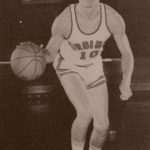 A team captain in both the 1968-69 and 1969-70 seasons under Bill Gibson, Case was an All-ACC Tournament first-team selection in 1970. Case notched four career double-doubles. He was drafted in the 18th round by the Baltimore Bullets, also drafted in the 1970 third round by the Buffalo Braves.
A team captain in both the 1968-69 and 1969-70 seasons under Bill Gibson, Case was an All-ACC Tournament first-team selection in 1970. Case notched four career double-doubles. He was drafted in the 18th round by the Baltimore Bullets, also drafted in the 1970 third round by the Buffalo Braves.
No. 6 Joe Harris (2011-14)
12.6 ppg, 3.8 rpg, .445 FG%, .407 3FG%
vs.
No. 11 Chip Conner (1962-64)
17.0 ppg, 8.1 rpg, .425 FG%
The MVP of 2014 ACC Tournament, Harris was a first-team All-ACC selection in 2013. He ranks 12th in scoring at UVA with 1,698 career points and second in 3-pointers made with 263. Harris was drafted in the second round of the 2014 NBA Draft by the Cleveland Cavaliers, and is now the starting shooting guard for the Brooklyn Nets. Harris won the NBA 3-Point Contest in 2019. Joey Buckets originally committed to Tony Bennett while he was head coach at Washington State. After Bennett was brought to Charlottesville, Harris took a leap of faith and followed him across the country and became one of the most beloved Wahoos of all time.
Conner ranks 40th on the Virginia all-time scoring list with 1,157 career points. After serving as team captain in Bill Gibson’s first year as head coach of the Wahoos in 1963-64, Conner went on to become an assistant under Gibson from 1969-74. Conner was one of the most honored Virginia players during his era, having been the only Cavalier to make the All-ACC first team between 1958 and 1972 (he achieved the feat in 1964), as well as qualifying for the league’s All-Academic Team that same season.
No. 3 Malcolm Brogdon (2012-16)
13.3 ppg, 4.1 rpg, .430 FG%, .365 3FG%
vs.
No. 14 Devin Smith (2003-05)
13.3 ppg, 5.1 rpg, .438 FG%, .353 3FG%
Brogdon was the first player to be named ACC Offensive & Defensive Player of the Year in the same season in 2016. He was a unanimous, consensus first-team All American and was named National Defensive Player of the Year in 2016. He was also an All-American in 2015. A first-team All-ACC selection three times (2014, 2015, 2016), Brogdon was named ACC co-defensive player of the year in 2015 with Darion Atkins. Brogdon owns the best free-throw percentage in UVA history with a minimum of 200 made (.876). He only missed 60 of his 482 career attempts from the charity stripe. Brogdon is ninth on the UVA all-time scoring list with 1,809 points, while ranking ninth in made 3-pointers with 185. He was named to the All-ACC Tournament first team in both 2014 and 2015 and he is the last Cavalier to have his number (15) retired. Drafted by the Milwaukee Bucks with the 36th pick of the 2016 NBA Draft, Brogdon went on to win NBA Rookie of the Year honors in 2017. He currently starts at point guard for the Indiana Pacers.
A transfer from Coffeyville Community College, Smith became a reliable contributor for Pete Gillen’s teams. Smith, who served as team captain in each of Gillen’s final two seasons in Charlottesville, ranks 43rd on Virginia’s all-time scoring list with 1,131 points. After a successful 12-year professional career overseas, which included a few league championship and MVP trophies, Smith officially hung up the sneakers in 2017 and has since moved into the coaching ranks.
No. 7 Curtis Staples (1995-98)
14.4 ppg, 4.0 rpg, .408 FG%, .383 3FG%
vs.
No. 10 J.R. Reynolds (2004-07)
14.0 ppg, 2.9 rpg, .410 FG%, .362 3FG%
If there were ever a name synonomous with 3-pointers when it comes to UVA basketball, look no further than Curtis Staples. One of the deadliest long-range shooters in college hoops history, Staples, an All-ACC third-team selection in 1998 and a member of the league’s All-Freshman Team in 1995, is Virginia’s all-time 3-pointers leader by far with 413 — for reference, Joe Harris sits in second place with 263. With a lightning-quick release that defenders had a hard time contesting, Staples held the NCAA Division I 3-point record for years. He ranks 11th on Virginia’s career scoring list with 1,757 points, setting the UVA single-season record with 130 3-pointers as a senior in 1997-98. Staples sank a school-record 9 triples on two different occasions and averaged a school-record 39.1 minutes in 1997-98. He is one of only five Cavaliers to record a school-record 7 steals in one game, one of many reasons his jersey is retired.
Reynolds was a two-time team captain in the first two seasons under coach Dave Leitao, and was an All-ACC second-team choice in 2007 and third-team selection in 2006, making a splash as a member of the All-Freshman Team in 2004-05. Reynolds was a strong scorer and was on UVA’s top-10 all-time scoring list when he finished his career. The 6-2 sharpshooter currently ranks 13th in scoring with 1,683 points. He’s also sixth on the 3-pointers made list with 221. A product of Roanoke and Oak Hill Academy, Reynolds teamed with Sean Singletary to give the Cavaliers one of the top backcourts in the country. Reynolds has enjoyed a successful professional career overseas and recently played in the top pro league in France.
No. 2 Buzzy Wilkinson (1953-55)
28.6 ppg, 4.5 rpg, .520 FG%
vs.
No. 15 Devon Hall (2014-18)
6.9 ppg, 3.2 rpg, .419 FG%, .389 3FG%
Wilkinson was an All-American and a first-team All-ACC selection in 1955. He holds top all-time scoring average of 28.6 points per game — not only in school history, but ACC history. Wilkinson was also a first-team All-ACC selection in 1954. The third-leading scorer in program history with 2,233 career points, Wilkinson held the scoring record for over 25 years before Jeff Lamp broke it. Wilkinson is responsible for the top two scoring seasons in school history. His 898 points as a senior is a school record. He scored 40 points or more on 10 different occasions, including a career-high 48 against Hampden-Sydney in Dec. 1954. Wilkinson owns nine of the top 10 single-game performances in UVA history. He scored 30 points or more a school-record 36 times — 19 times as a senior in 1954-55. Wilkinson sank a school-record 18 free throws (on a career-high 25 attempts) against Duke in 1955. His No. 14 is retired at UVA. Wilkinson was chosen by the Boston Celtics in the third round of the 1955 NBA Draft.
Hall, who knocked off Tony Laquintano in the play-in round, enjoyed a solid four-year career under Bennett, and was part of the Cavaliers’ 2014 ACC Tournament championship team, just the second team to achieve that feat in program history. Hall, a member of the All-ACC second team and All-Defensive Team in 2018, was also named an All-ACC Tournament first-teamer in the postseason when the ‘Hoos won their third tournament title. The 6-5, 211-pound Virginia Beach native averaged 6.9 points and 3.2 rebounds per game, and had a career 3-point shooting average of 39 percent. Hall was a complete player on both ends of the floor and was drafted in the second round by the Oklahoma City Thunder in the 2018 NBA Draft.



